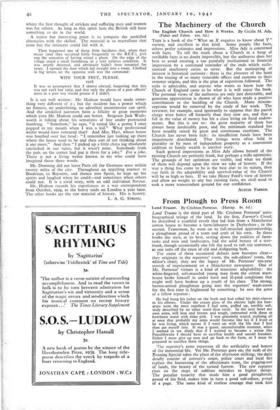The Machinery of the Church
Tins is a book of the " What an X requires to know about Y" variety, and excellent in that kind. Some people like facts,
others prefer estimates and impressions. Miss Ady is concerned with facts. To tell the truth about a Church in a heap of verifiable facts is no doubt impossible, but the authoress does her best to avoid creating a too painfully institutional or financial impression by a continued reminder of the ends which eccle- siastical machinery exists to serve. But the mainspring of interest is historical curiosity : there is the pleasure of the hunt in the tracing of so many venerable offices and customs to their remoter origins, and this is the plan of exposition followed. The style is admirable, and anyone who wants to know how the Church of England came to be what it is will enjoy the book. The personal views of the authoress are only just detectable, and generous appreciation is shown of all who have made a positive contribution to the building of the Church. Many miscon- ceptions would be removed by the study of her work. The reviewer, for example, used ignorantly to suppose that the parish clergy were better off formerly than they now are, and that a fall in the value of money has hit a class living on fixed endow- ments. But this is not so: the great majority of them has always been intolerably poor, and the minimum standard has been steadily raised by great and continuous exertions. The Church has never been rich : its insufficient funds have been iniquitously distributed. That livings were often heldm plurality or by men of independent property as a convenient addition to family wealth is another story.
Such general impressions as Miss Ady allows herself of the existing Church are perfectly frank, but perhaps a trifle optimistic. The grounds of her optimism are visible, and what we think of them will depend upon the view we take of history. If the way a thing has come to be is the best clue to its nature, then our faith in the adaptability and survival-value of the Church will be as high as hers. If we take Henry Ford's view of history and allow no weight to any but existing facts, we shall need to seek a more transcendant ground for our confidence.
AUSTIN FARRER.


























 Previous page
Previous page